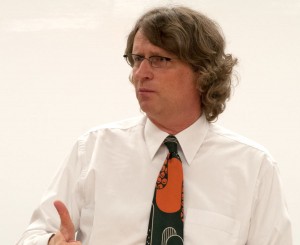Consul offers analysis of global politics
Stefan Biedermann, a deputy consul at Germany’s Los Angeles Consulate, voiced his personal opinions on the history and current state of the European Union during a conversation Wednesday in the Social Sciences Building.
The event, sponsored by the School of International Relations and the International Relations Undergraduate Association, featured Biedermann, a native of Bavaria who has served as a diplomat for 19 years, as the main speaker. Biedermann offered students a rare inside look at the world of international politics.

Analysis · Deputy German Consul Stefan Biedermann delved into the politics of the European Union at an event on Wednesday. – Priyanka Patel | Daily Trojan
The European Union is currently facing a severe debt crisis exacerbated by ugly political infighting — a topic he did not shy away from.
Biedermann, however, thinks the negativity surrounding the European Union hides the positive impact it has had on the world up to this point, telling stories of his grandfather who grew up in a very different Europe than the one today.
“My grandfather … grew up in a [Germany] that was very much influenced by nationalism [and] in school, he was taught that France was an eternal foe,” Biedermann said. “‘The French are our eternal foe. We are better than them,’ he was told.”
Up to that point, Biedermann said Germany had only achieved unification by waging wars on neighbors.
“If you look at European history, [Germany has] had one war after the other,” he said.
After World War II, however, the majority of European countries agreed that the violence had to end — one reason the European Union was born. Though Biedermann said the EU is not perfect, he said it has transformed Europe into a completely different entity than what it was when Biedermann’s grandfather was growing up.
“If you look at my grandfather, within his lifetime there were two wars against France. But at the end of his life the borders between Germany and France have completely disappeared,” Biedermann said. “I would call that a miracle.”
Biedermann also pointed to the impending admission of Croatia to the EU as a sign of good things to come.
According to Biedermann, much of the negative press about the European Union has to do with a lack of perspective from the younger generation.
“The new generation … doesn’t know the price we have paid to get rid of borders. … The generations that went to war know how important it is to have the European Union,” Biedermann said.
Still, Biedermann said the EU is still a work in progress that will have to deal with many upcoming challenges, including the reemergence of nationalist thinking among certain European communities.
“We have to be very vigilant so that we don’t fall back into the old nationalist ideas we had before,” Biedermann said.
